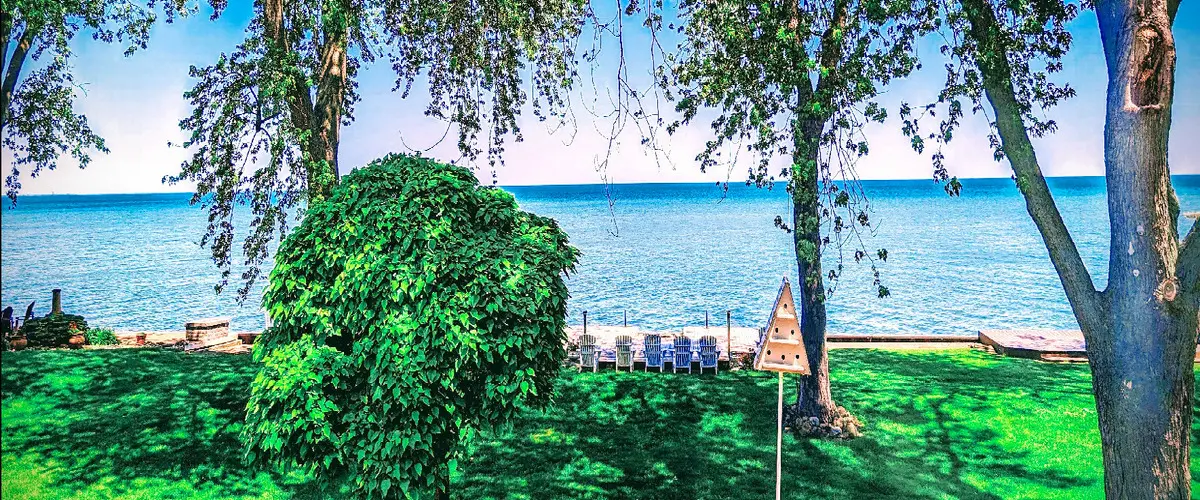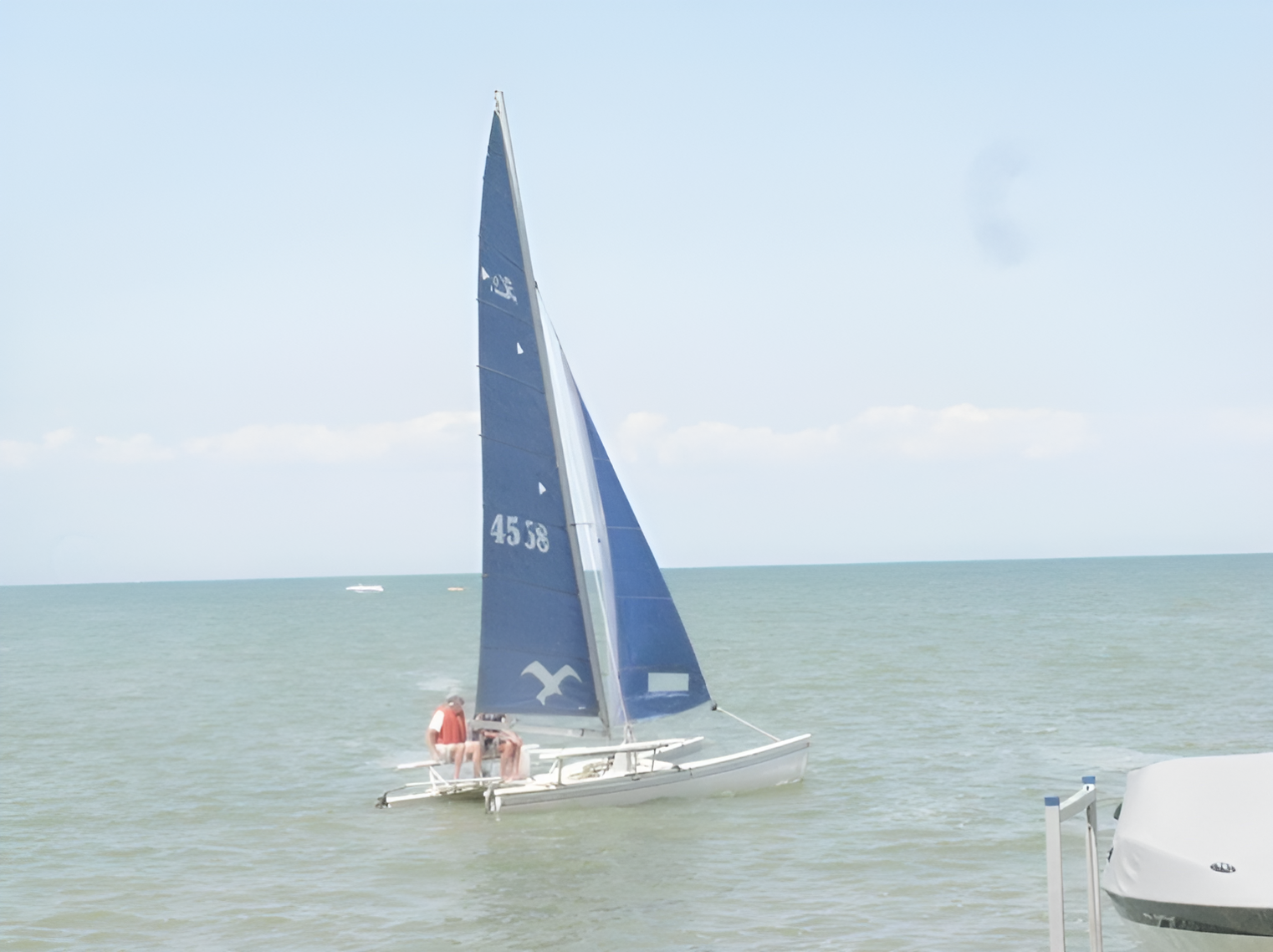The following is a true story that I want to put in writing while I’m still able to. The other person in this story is my father-in-law, John (Pep). Pep passed away in 2016 at 94, and as far as I know, he took this story with him to the grave.
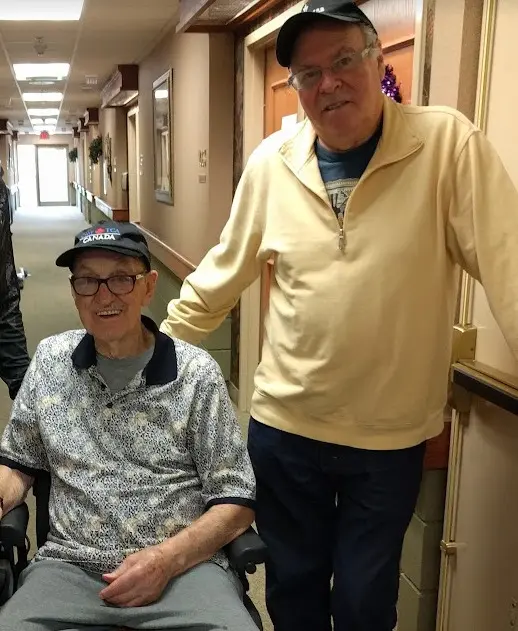
To fully appreciate this story, you need to know a bit about Pep. Having lived through the Great Depression, that experience profoundly shaped his outlook on life and the way he handled money. He wasn’t just frugal—he took thriftiness to a whole new level. For instance, Pep would walk half a mile just to save a quarter on a parking meter. He timed his trips to the market for just before closing, knowing vendors would mark down prices to get rid of leftover stock. And on garbage day, you could find him riding his bike through the neighbourhood, hunting for anything worth salvaging. These habits might seem extreme to some, but they were second nature to Pep. He had a real knack for stretching a dollar further than most people would even try.
One of Pep’s greatest loves was sailing, and I think a big part of the appeal for him was that it was free. Every Thursday, my wife Cathie and I would host her parents, Pep and Mem (Louise), for a visit and dinner. If the weather was good, Pep and I would head out on my 18-foot catamaran for a sailing adventure. It became a regular part of our routine, a time for Pep and I to bond over something we both enjoyed so much.
On a few of these sailing trips, Pep’s hat would blow off in the wind. Each time, we’d do an immediate 180-degree turn, trying to sail back to retrieve it before it sank. Usually, we weren’t successful. Pep’s solution? He started keeping a box of old, worn-out hats—hats that anyone else would have thrown in the garbage. These became his “sailing hats.”
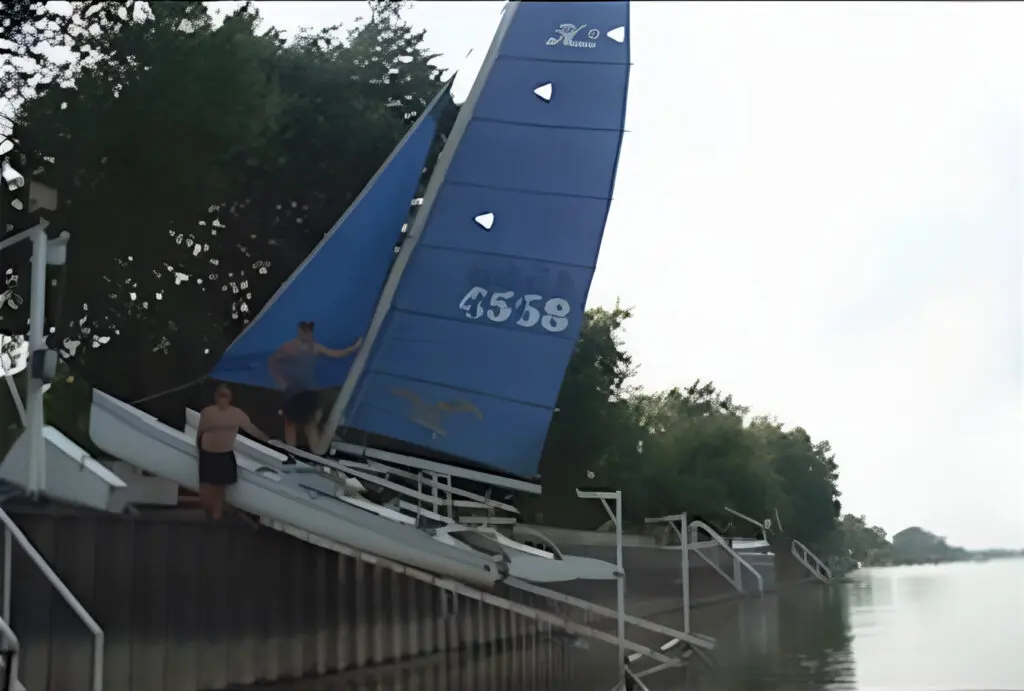
On this particular day, the conditions were perfect for sailing. We launched the boat off my break wall and set out on our adventure. Normally, we sailed purely for fun, but Pep always had an eye out for anything floating in the water that he could investigate or salvage. We often collected beer and pop cans to redeem for deposit money.
This time, Pep spotted something big floating in the distance. We sailed over to check it out and discovered it was a large piece of lumber, about 10 feet long, 8 inches wide, and 5 inches thick—a serious hazard for other boaters. Without hesitation, we hoisted the massive board onto the catamaran and tied it securely to one of the pontoons.
We continued sailing, enjoying the 20-knot south wind, when I noticed something on the horizon—a rogue wave was forming and rapidly approaching us. We weren’t too concerned at first, as we had sailed in rough water many times before. However, this wave was unusual. It was quite large, and waves like this are typically only generated by vessels the size of a lake freighter. But the freighters are required to stay in the 40-foot-deep shipping channel, which was eight miles away. As we watched the wave approach, we estimated it to be around three feet high. Just as it was about to reach us, Pep made the decision to turn the catamaran so we could take the wave head-on. He assumed the pontoons would climb over the top of the wave, as they usually would. But that’s not what happened.
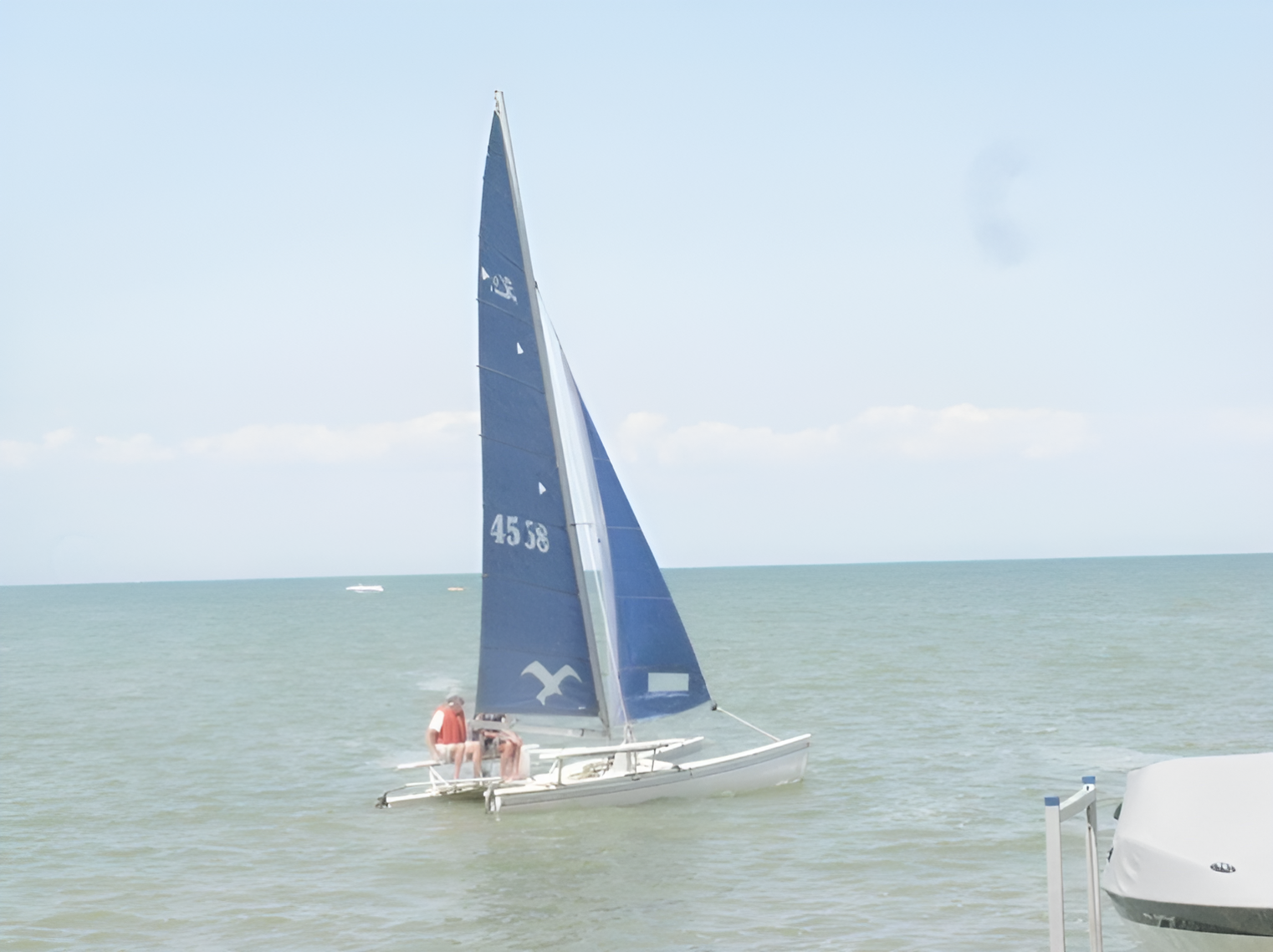
Instead of climbing over, the pontoons nosedived under the wave. This sudden action caused the catamaran to stop dead in the water, and the back of the boat lifted up until the mast hit the surface of the lake. It felt as if we were shot out of a catapult—we were thrown about thirty feet into the water. I lost both my hat and glasses when I went under. When I surfaced, I quickly swam toward the boat. I could see Pep swimming too, but he was trying to retrieve his hat before it sank. I had to swim a good distance to reach the boat, and just as I did, the sail caught the wind and began sailing away.
Unfortunately for me, I had reached the side of the boat where we had tied the large piece of timber we’d collected earlier. This made it impossible for me to climb aboard and control the sails. The only option I had was to hang on to the side of the boat and hope that the wind would eventually die down. It felt like an eternity as I was dragged through the water, clinging to the side of the boat. The wind was relentless, and my arms were beginning to go numb. I knew I couldn’t hold on much longer. In a final, desperate effort, I tried to swing my leg over the timber, but it was no use. Exhausted, I slipped back into the water and watched helplessly as the catamaran sailed away without me.
I took a moment to assess my situation. The shoreline was miles away, and there wasn’t a single boat in sight. The reality of my predicament hit me hard. I thought, this might be it—I thought I was a goner. I wondered what had happened to Pep. The last time I saw him, he was still trying to catch his hat before it sank. We had been about a mile from shore then, and I hoped there were other boats nearby that could rescue him. Meanwhile, I made the decision to start swimming toward shore myself. I managed to swim about a hundred yards before realizing how futile it was. My bulky life jacket was chafing against my sides, and the wind was likely pushing me back as fast as I was making any progress. To make matters worse, I was beginning to feel the chill. I hadn’t even considered the possibility of hypothermia setting in.
I’ve heard stories of people having near-death experiences, saying things like, “I saw my life flash before my eyes.” That didn’t happen to me. Instead, I kept imagining the newspaper headlines. “Two Men Missing on Lake St. Clair. Search and Rescue Called Off for the Night.” And the next day’s update: “The Bodies of Two Men Recovered, Found Three Miles Apart.”
As I drifted, lost in those grim thoughts, my solitude was interrupted by the faint sound of a boat in the distance. I could see it now, heading out towards the middle of the lake. Suddenly, a small spark of hope flared within me. Desperate, I pushed myself up out of the water as much as I could and began waving my arms wildly. But the boat, about half a mile away, didn’t notice me. It kept on its course, oblivious to the man struggling in the water beside them.
I wasn’t too far removed from the disappointment of the last boat when my hopes were reignited. In the distance, I spotted another boat approaching from the side, this one heading much closer to my position than the previous one. As it drew nearer, I waited until it was close enough that there was a chance they might see me. Once again, I pushed myself as high as I could out of the water and frantically waved my arms. I didn’t bother yelling—it was pointless given the roar of the boat’s motor.
The boat came within about three hundred yards, directly in front of me, but it seemed the people onboard had their eyes fixed straight ahead and still hadn’t noticed me. My heart sank for a moment, but then, something incredible happened. The boat started to change direction—it was coming straight toward me.
I felt a wave of relief like no other. I was going to live!
The boat that approached was a 24-foot cabin cruiser. I clambered aboard, drenched and exhausted, and blurted out, “You saved my life.” Their faces were filled with a mixture of curiosity and concern, as if silently asking, “What in the world happened to you that you were stranded in the middle of the lake?” I quickly gave them a brief explanation. “I was thrown off my sailboat, and it sailed off without me,” I said, pointing to the distant horizon where a small dot represented the runaway catamaran. “And there it is.”
Without hesitation, they started their boat, and we began the chase. I was grateful beyond words but now began to think about Pep. Was he rescued? I hadn’t seen him since we were thrown overboard. I could only hope.
As we pursued the runaway catamaran, the mother approached me, concern etched on her face. “You are very lucky,” she said. “If my daughter hadn’t noticed you waving your arms, we would have passed right by.” Her words hit me hard. I felt a rush of gratitude but also a gnawing fear. What about Pep? Had anyone seen him? Was he still out there, drifting, like I had been? I forced myself to focus on the immediate task: retrieving the catamaran.
To my surprise, we were closing in fast. The catamaran that had seemed so distant when we first began the chase now loomed closer, almost within reach. As I squinted to get a better look, I suddenly realized why we were closing the distance so quickly: there was someone on the catamaran, sailing directly toward us.
It had to be Pep! He must have been rescued and somehow made his way back to the runaway catamaran. Relief washed over me as I pieced it together—Pep had likely been picked up by that first boat I had desperately waved at, the one that hadn’t seen me. They must have brought him to the drifting catamaran, allowing him to regain control.
In that moment, all my fears and doubts started to fade. We were safe, and soon we’d both be back on solid ground. But first, I had to get Pep’s attention and let him know I was on the cabin cruiser. I waved my arms, and I think he recognized me by my bright yellow life jacket. Pep brought the catamaran alongside us, loosening the sails to slow down as much as possible. Timing it just right, I jumped from the cruiser and landed on the trampoline matting of the catamaran.
As I caught my breath, I realized that in the chaos and relief, I hadn’t even gotten the names of the couple who had saved my life. They had been so kind, yet in my rush to reunite with Pep and safely land on the sailboat, I hadn’t stopped to thank them properly or even ask their names. I regret that to this day—those strangers had given me the greatest gift of all: another chance at life. And to make matters worse, I never gave them the full story. They must have assumed I had fallen off the sailboat and that Pep, oblivious, had sailed for miles without realizing I was gone.
Pep and I were both relieved to see each other, our concerns melting away. He greeted me with a wide grin, proudly proclaiming, “I saved my hat!” I glanced at him and couldn’t help but smile back—he didn’t realize he was actually wearing my hat. But I didn’t burst his bubble. Surprisingly, we didn’t talk much about our near-death ordeal. Instead, we focused on sailing back home, hoping to make it in time for dinner.
As we neared home, Pep broke the silence. “We can never tell Louise and Cathie what happened,” he said with a serious tone. I nodded in agreement. We both knew that if they ever found out about our close call, they’d never let us go sailing again. So, we made a silent pact to keep it a secret from everyone. This was a story that could never get back to them.
We were later than usual getting home, but no one was concerned since our sailing trips often stretched longer than planned. That’s just the nature of sailing—there are always countless reasons for delays. The large timber that had nearly cost me my life was untied from the catamaran, and I decided to cut it up for firewood later. During dinner, I found it difficult to conceal my overwhelming sense of happiness. That day had profoundly changed my life, because I realized that from then on, I’d be living on borrowed time. I truly believe that the experience made me a better person, more aware of how precious life is.
When this event took place, Pep was 72 and I was 46. We continued sailing together for another 18 years, sharing many new adventures. However, none of them were quite as notable as the story I’ve just recounted. Sadly, when Pep turned 90, Louise put her foot down and told him, “No more sailing for you Johnny—you’re no spring chicken.” Though disappointed, Pep knew she was right. After that, I tried sailing by myself, but it just wasn’t the same. I felt lonely, and it was also too difficult to manage all the sails and the rudder on my own. Years earlier, Cathie had sailed with me, but after a sudden gust of wind tipped the catamaran, she never sailed with me again. And without Pep by my side, the joy I once found in sailing started to fade. Eventually, I decided it was time to move on. I put the catamaran up for sale and sold it to someone in Ottawa. It felt like the end of an era, but in many ways, the memories of those years of sailing remain some of the most precious of my life.
I hope that you enjoyed this.
Rob
